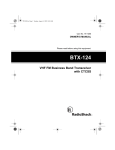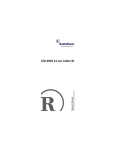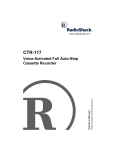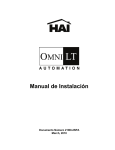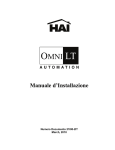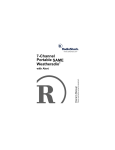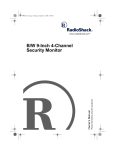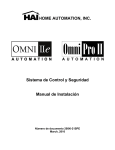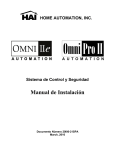Download Radio Shack BTX-128 Owner`s manual
Transcript
19-1207.fm Page 1 Friday, November 10, 2000 11:04 AM BTX-128 2-Channel 1-Watt UHF Business Band Transceiver Please read before using this equipment. Owner’s Manual with CTCSS 19-1207.fm Page 2 Friday, November 10, 2000 11:04 AM ˆ Contents FCC Regulations ................................ 5 FCC License Required ..................... 5 FCC Part 90 Rules ........................... 7 A Quick Look at Your Transceiver .............................. 13 Preparation ....................................... 14 Installing the Battery Pack ............. 14 Charging the Battery Pack ............. 15 Connecting the Antenna ................ 17 Using the Belt Clip ......................... 19 Connecting an Earphone/ External Speaker ........................... 19 Using an External Speaker/ Microphone .................................... 22 Setting Frequency Options ............ 22 © 2000 RadioShack Corporation. All Rights Reserved. RadioShack and RadioShack.com are trademarks used by RadioShack Corporation. 2 Contents 19-1207.fm Page 3 Friday, November 10, 2000 11:04 AM Setting a UHF Business Band Frequency ..................................... 23 About Quiet Tone ........................... 28 Operation .......................................... 33 Care ................................................... 35 Specifications .................................. 36 ˆ Features Your RadioShack 2-Channel 1-Watt UHF Business Band Transceiver is a portable, two-way business radio service transceiver that you can carry almost anywhere. The transceiver is compact and light, making it an ideal choice for your business needs. Programmable Frequencies — an authorized service facility can program the Features 3 19-1207.fm Page 4 Friday, November 10, 2000 11:04 AM transceiver to any UHF business band frequency you have a license to use – no crystals to buy! Note: Your local RadioShack store must send the transceiver to an authorized service facility to program the transceiver with a frequency. You must show your license to store personnel. 38 Quiet Tone CTCSS (Continuous Tone Control Squelch System) — helps reduce interference from other transceivers which are operating on the same frequency, in the same area. PLL-Controlled Circuitry — provides accurate and stable channel selection. TX/BATT Indicator — flashes green while the transceiver is turned on, lights green while transmitting, and turns red when battery is low. 4 Features 19-1207.fm Page 5 Friday, November 10, 2000 11:04 AM ˆ FCC Regulations FCC LICENSE REQUIRED This transceiver is intended for use in the operation of commercial activities, educational, philanthropic, or ecclesiastical institutions, and hospitals, clinics, or medical associations. The Federal Communications Commission (FCC) requires you to have a license before you operate this transceiver. Unless you are already licensed to operate on one of the preset frequencies, you must apply for a frequency through the PCIA (Personal Communication Industry Association), a non-profit organization that assigns frequencies nationwide to help prevent conflicts between different businesses using transceivers in the FCC Regulations 5 19-1207.fm Page 6 Friday, November 10, 2000 11:04 AM same area. For more information about getting a license, contact the PCIA at 800-759-0300, extension 3068 (in Virginia 703-739-0300, extension 3068). For other questions concerning the license application, contact the FCC at 717-337-1212, or write: FCC P.O. Box 1040 Gettysburg, PA 17325 For the latest FCC application form and instructions, call the FCC's fax-ondemand service at 1-202-418-0177 from a fax machine and request one or more of the following documents: To receive: All forms and instructions 6 FCC Regulations Enter: 000600 19-1207.fm Page 7 Friday, November 10, 2000 11:04 AM To receive: Enter: Form 600 instructions only 006001 Main Form 600 only 006002 Form 600 schedules only 006003 If you do not have a fax machine, you can call the Government Forms Distribution Center at 1-800-418-FORM and request that the form and instructions be mailed to you. FCC PART 90 RULES You must be familiar with Part 90 of FCC Rules before you operate your transceiver. The operation instructions in this manual conform to Part 90, but do not cover all items in Part 90. FCC Regulations 7 19-1207.fm Page 8 Friday, November 10, 2000 11:04 AM Overall, Part 90 states that: • You must have a valid license before you use the transceiver. • As licensee, you are responsible for proper operation of all transceivers operating under your license authority. • You can let unlicensed persons operate this transmitter, as long as you take precautions to prevent unauthorized transmissions. • You must use this transceiver only for the commercial use of your business, and only when other commercial channels (such as the telephone) are either not available or not practical. 8 FCC Regulations 19-1207.fm Page 9 Friday, November 10, 2000 11:04 AM • You must always yield the operating frequency to communications that involve the safety of life or property. • You must take reasonable precautions to prevent harmful interference to other services operating on the same frequency. • You must not transmit program material of any kind used in connection with commercial broadcasting. • You must not provide a service that is normally handled by telephone or telegraph unless such broadcasts involve the safety of life or property or in emergencies such as an earthquake, hurricane, flood or a similar disaster where normal communication channels are disrupted. FCC Regulations 9 19-1207.fm Page 10 Friday, November 10, 2000 11:04 AM • During each transmission or exchange of transmissions, you must identify your station with the call sign issued to you by the FCC, or once each 15 minutes during periods of continuous operation. • You must keep a written record of any maintenance or modification made to the transceiver, and you must make this record available for inspection upon demand by the FCC. Violating any of the provisions of Part 90 can result in fines and/or confiscation of equipment. Your equipment might cause TV or radio interference even when it is operating properly. To eliminate interference, you can try one or more of the following corrective measures: 10 FCC Regulations 19-1207.fm Page 11 Friday, November 10, 2000 11:04 AM • reorient or relocate the receiving antenna • increase the distance between the equipment and the radio or TV • use outlets on different electrical circuits for the equipment and the radio or TV Consult your local RadioShack store if the problem still exists. You must use shielded interface cables with this equipment. Additional FCC Regulations The Business Radio Service is under the jurisdiction of the Federal Communications Commission (FCC). Any adjustments or alterations that would alter the FCC Regulations 11 19-1207.fm Page 12 Friday, November 10, 2000 11:04 AM performance of the transceiver so it no longer meets the original FCC type acceptance or would change the frequencydetermining method are strictly prohibited. Replacement or substitution of crystals, transistors, integrated circuits, regulator diodes, or any other component that is of a unique nature with components other than those recommended can violate the technical regulations of the FCC Rules or violate type acceptance requirement of the rules. Before you operate the transceiver, you must obtain your license. It is illegal to transmit without the appropriate license, which you can get by submitting a completed FCC Form 600 to the FCC (or through the PCIA). Furthermore, you are required to understand Part 90 of the 12 FCC Regulations 19-1207.fm Page 13 Friday, November 10, 2000 11:04 AM FCC Rules prior to operating your transceiver. It is the user's responsibility to see that this unit is operating at all times in accordance with the FCC Rules. ˆ A Quick Look at Your Transceiver CHANNEL A/B VOLUME/OFF PTT TX/BATT MON EAR/MIC A Quick Look at Your Transceiver 13 19-1207.fm Page 14 Friday, November 10, 2000 11:04 AM ˆ Preparation INSTALLING THE BATTERY PACK The supplied Ni-MH battery pack, when fully charged, provides power to your transceiver for up to 10 hours. You must install the battery pack into your transceiver, then charge it. Caution: Do not remove the plastic wrap from the battery pack. Doing so can permanently damage the battery. 1. Slide LOCK on the battery compartment cover to the right to unlock it, then slide the battery compart- 14 Preparation LOCK 19-1207.fm Page 15 Friday, November 10, 2000 11:04 AM ment cover in the direction of the arrows and lift it off. 2. Plug the battery pack’s connector into the connector inside the battery compartment. Then place the battery pack in the compartment. Note: The connector fits only one way. Do not force it. 3. Replace the battery compartment cover, then slide LOCK to the left to lock the cover. CHARGING THE BATTERY PACK Before you use the battery pack for the first time, you must use the supplied battery charger to charge it for about 14 hours. You cannot use the transceiver while you charge the battery pack. Preparation 15 19-1207.fm Page 16 Friday, November 10, 2000 11:04 AM To ensure maximum range, operate the transceiver with the battery pack fully charged. As the voltage decreases, the range decreases. Caution: The supplied 12V DC, 200 mA battery charger was designed specifically for your transceiver. Use only the supplied battery charger. 1. Turn VOLUME/OFF fully counterclockwise until it clicks to turn off the transceiver. 2. Pull out the rubber cover on the DC 12V jack on the lower side of the transceiver and insert the charger’s barrel plug into the jack. Then plug the other end of the charger into a standard AC outlet. If TX/BATT lights red and flashes green when the transceiver is on, the transceiver has about 60 minutes of 16 Preparation 19-1207.fm Page 17 Friday, November 10, 2000 11:04 AM battery power remaining. Recharge the battery pack. 3. Unplug the AC adapter from the AC outlet after the battery is fully charged. Caution: Although the battery pack is designed to be charged using the supplied battery charger for up to a year, do not charge the battery pack longer than 24 hours at a time. CONNECTING THE ANTENNA 1. Align the slots around the antenna’s connector with the tabs on the antenna jack on the top of the transceiver. Preparation 17 19-1207.fm Page 18 Friday, November 10, 2000 11:04 AM 2. Press the antenna down over the jack and turn the antenna’s base clockwise until it locks into place. 3. To detach the antenna, turn the antenna’s base counterclockwise. Then lift off the antenna. Connecting an Optional Antenna Although the supplied rubber duck antenna provides excellent local reception, you can connect an optional external mobile antenna or outdoor base station antenna to your transceiver for better reception of weak signals. The antenna jack on the top of the transceiver makes it easy to use the transceiver with a variety of antennas. Your local RadioShack store sells a variety of antennas. 18 Preparation 19-1207.fm Page 19 Friday, November 10, 2000 11:04 AM USING THE BELT CLIP The supplied belt clip lets you easily attach the transceiver to your belt. Slide the belt clip onto the tab at the back of the transceiver until it clicks. To remove the clip, pull up on its middle tab and slide it down. CONNECTING AN EARPHONE/EXTERNAL SPEAKER To listen privately or to hear better in a large area such as a warehouse, you can pull up the rubber cover on the EAR and MIC jacks, then plug a monaural earphone or an external speaker with a 3.5 mm (1/8 inch) plug (not supplied) into the EAR jack on the side of the transceiver. Preparation 19 19-1207.fm Page 20 Friday, November 10, 2000 11:04 AM This automatically disconnects the builtin speaker. Listening Safely To protect your hearing, follow these guidelines when you use an earphone. • Set the volume to the lowest setting before you begin listening. After you begin listening, adjust the volume to a comfortable level. • Do not listen at extremely high volume levels. Extended high-volume listening can lead to permanent hearing loss. • Once you set the volume, do not increase it. Over time, your ears adapt to the volume level, so a volume level that does not cause dis20 Preparation 19-1207.fm Page 21 Friday, November 10, 2000 11:04 AM comfort might still damage your hearing. Traffic Safety Do not use an earphone with your transceiver when operating a motor vehicle or riding a bicycle in or near traffic. Doing so can create a traffic hazard and could be illegal in some areas. If you use an earphone with your transceiver while riding a bicycle, be very careful. Do not listen to a continuous broadcast. Even though some earphones let you hear some outside sounds when listening at normal volume levels, they still can present a traffic hazard. Preparation 21 19-1207.fm Page 22 Friday, November 10, 2000 11:04 AM USING AN EXTERNAL SPEAKER/MICROPHONE An external speaker/microphone can make it easier to use the transceiver when you clip it to your belt, so you do not have to lift the transceiver to your mouth each time you transmit. Pull up the rubber cover from the EAR and MIC jacks and plug the speaker/microphone’s 2.5 mm (3/32 inch) plug into the jacks. This automatically disconnects the transceiver’s built-in speaker and microphone. SETTING FREQUENCY OPTIONS Before you can use your transceiver, you must set your transceiver to a UHF business band frequency you have a license to use. Then you can select a preset quiet tone CTCSS (Continuous Tone Con22 Preparation 19-1207.fm Page 23 Friday, November 10, 2000 11:04 AM trol Squelch System) frequency and set your transceiver to use it. 1. Set your transceiver to a UHF business band frequency (see “Setting a UHF Business Band Frequency” on Page 23). 2. Select a quiet tone frequency then set the DIP switches to that frequency (see “Using a Quiet Tone Frequency” on Page 29). You can select one quiet tone frequency at a time. If you do not want to use a quiet tone frequency, skip Step 2. SETTING A UHF BUSINESS BAND FREQUENCY There are eight UHF business band frequencies available in your transceiver. Preparation 23 19-1207.fm Page 24 Friday, November 10, 2000 11:04 AM • • • • • • • • 464.50 MHz (Brown Dot) 464.550 MHz (Yellow Dot) 467.7625 MHz (J Dot) 467.8125 MHz (K Dot) 467.850 MHz (Silver Star) 467.875 MHz (Gold Star) 467.900 MHz (Red Star) 467.925 MHz (Blue Star) Channel A is preset to 464.550 MHz and Channel B is preset to 464.500 MHz. You can set Channel A or B to any frequency listed on Page 24. 1. Turn VOLUME/OFF fully counterclockwise until it clicks to turn off the transceiver. 2. Remove the battery compartment cover. Then lift up the plastic cover marked QUIET. 24 Preparation 19-1207.fm Page 25 Friday, November 10, 2000 11:04 AM Note: Be sure the battery pack is connected. 3. Hold down PTT and MON, then turn VOLUME/OFF clockwise to turn on the transceiver. The transceiver beeps once. 4. Press MON once. The transceiver sounds a two-tone sequence. 5. Rotate CHANNEL A/B to select the channel you want to set. Preparation 25 19-1207.fm Page 26 Friday, November 10, 2000 11:04 AM 6. Choose a UHF dot frequency from the list on Page 24. Then use a pointed object such as DIP a straightened paper clip to Switches set the position of each DIP switch to 1 (up) or 0 (down) as indicated in the following table. Channel Frequency Number (MHz) 26 DIP Switch Setting 0 = down 1 = up 1 464.5000 000001 2 464.5500 000010 3 467.7625 000011 4 467.8125 000100 5 467.8500 000101 Preparation 19-1207.fm Page 27 Friday, November 10, 2000 11:04 AM Channel Frequency Number (MHz) DIP Switch Setting 0 = down 1 = up 6 467.8750 7 467.9000 000110 000111 8 467.9250 001000 7. Press MON once. If the DIP switch setting is correct, the transceiver sounds a three-tone sequence. If the DIP switch setting is incorrect, the transceiver beeps once. 8. Turn the transceiver off then on. Note: If you do not turn off the transceiver to reset the power, the original frequency setting remains unchanged. If you want to set your transceiver to a UHF business band frequency other than Preparation 27 19-1207.fm Page 28 Friday, November 10, 2000 11:04 AM the frequencies listed on Page 24, you can take your transceiver to an authorized facility to set your transceiver to a frequency you have a license to use. ABOUT QUIET TONE Quiet tone helps eliminate interference between different users of the same frequency, letting you talk and listen to people who are using other transceivers set to the same frequency and quiet tone code. This is like having a sub-channel within a channel, giving you greater communication flexibility. When you set a quiet tone code — there are 38 to choose from — and turn on your transceiver’s quiet tone, the transceiver transmits a tone with your transmission, letting you communicate with anyone who has a transceiver set to the same frequency 28 Preparation 19-1207.fm Page 29 Friday, November 10, 2000 11:04 AM and code. This tone is too low for you to hear, but other transceivers can detect it. Once you set a quiet tone on the transceiver, it only receives those transmissions that include the same tone. If two different groups operate transceivers in the same area on the same frequency, they do not hear each other’s broadcast if they both use quiet tone and each selects a different quiet tone. Using a Quiet Tone Frequency 1. Turn VOLUME/OFF fully counterclockwise until it clicks to turn off the transceiver. 2. Remove the battery compartment cover. Then lift up the plastic cover marked QUIET. Preparation 29 19-1207.fm Page 30 Friday, November 10, 2000 11:04 AM 3. Choose a quiet tone code from the following table, then use a pointed object such as a straightened paper clip to set the position of each DIP switch to 1 (up) or 0 (down) as indicated in the following table. Quiet Frequency Code (Hz) DIP Switch Setting 0 = down 1 = up None 30 000000 1 67.0 000001 2 71.9 000010 3 74.4 000011 4 77.0 000100 5 79.7 000101 6 82.5 000110 7 85.4 000111 8 88.5 001000 9 91.5 001001 10 94.8 001010 Preparation 19-1207.fm Page 31 Friday, November 10, 2000 11:04 AM Quiet Frequency Code (Hz) DIP Switch Setting 0 = down 1 = up 11 97.4 001011 12 100.0 001100 13 103.5 001101 14 107.2 001110 15 110.9 001111 16 114.8 010000 17 118.8 010001 18 123.0 010010 19 127.3 010011 20 131.8 010100 21 136.5 010101 22 141.3 010110 23 146.2 010111 24 151.4 011000 25 156.7 011001 26 162.2 011010 Preparation 31 19-1207.fm Page 32 Friday, November 10, 2000 11:04 AM Quiet Frequency Code (Hz) DIP Switch Setting 0 = down 1 = up 27 167.9 011011 28 173.8 011100 29 179.9 011101 30 186.2 011110 31 192.8 011111 32 203.5 100000 33 210.7 100001 34 218.1 100010 35 225.7 100011 36 233.6 100100 37 241.8 100101 38 250.3 100110 4. Replace the plastic cover and the battery compartment cover. Then turn VOLUME/OFF clockwise until it 32 Preparation 19-1207.fm Page 33 Friday, November 10, 2000 11:04 AM clicks to turn on the transceiver. The transceiver sets the quiet tone code. Note: If the DIP switch setting is not listed in the table on Pages 30–32, no tone is set. ˆ Operation Notes: • You can only communicate with another transceiver that is using the same channel and/or the same quiet tone code as your transceiver. • Your transceiver’s range varies depending on factors such as position, terrain, and battery condition. Buildings absorb transmitted signals and, if they contain metal, might Operation 33 19-1207.fm Page 34 Friday, November 10, 2000 11:04 AM completely block the signals. Trees and heavy cloud formations have a similar effect, though not as severe. 1. Turn VOLUME/OFF clockwise to turn on the transceiver. The TX/BATT indicator flashes green about once per second. 2. Rotate CHANNEL A/B to select the preset channel A or B. 3. To transmit, hold down PTT. Then hold the transceiver about 3 inches from your mouth and speak slowly in a normal voice. The TX/BATT indicator lights green. Release PTT when you finish your transmission. Note: If you hold down PTT for more than 2 minutes, the transceiver automatically stops transmitting and 34 Operation 19-1207.fm Page 35 Friday, November 10, 2000 11:04 AM sounds an alert tone. The TX/BATT indicator flashes green. 4. To hear everything that happens on the channel including weak transmissions, press MON. 5. Turn VOLUME/OFF fully counterclockwise until it clicks to turn off the transceiver. ˆ Care Modifying or tampering with the transceiver’s internal components can cause a malfunction and might invalidate its warranty and void your FCC authorization to operate it. If your transceiver is not performing as it should, take it to your local RadioShack store for assistance. Care 35 19-1207.fm Page 36 Friday, November 10, 2000 11:04 AM ˆ Specifications Frequency Range .. 461.0375–469.5625 MHz Channels ...................................................... 2 Modulation Type ........................................ FM Power Supply .......................... 6V, 1400 mAh Ni-MH battery pack Channel Bandwidth ............. 25 kHz/12.5 kHz Transmit Power ................................ 1W ERP External Earphone Jack ............................. 1 8 / -inch (3.5 mm) External Microphone Jack ................ 3/32-inch (2.5 mm) Dimensions ........... 213/16 × 53/16 × 15/8 inches (72 × 132 × 41 mm) Weight (with battery pack) .................. 11.6 oz 0.33 kg) 36 Specifications 19-1207.fm Page 37 Friday, November 10, 2000 11:04 AM Specifications are typical; individual units might vary. Specifications are subject to change and improvement without notice. Specifications 37 19-1207.fm Page 38 Friday, November 10, 2000 11:04 AM ˆ Notes 38 Notes 19-1207.fm Page 39 Friday, November 10, 2000 11:04 AM Limited One-Year Warranty This product is warranted by RadioShack against manufacturing defects in material and workmanship under normal use for one (1) year from the date of purchase from RadioShack company-owned stores and authorized RadioShack franchisees and dealers. EXCEPT AS PROVIDED HEREIN, RadioShack MAKES NO EXPRESS WARRANTIES AND ANY IMPLIED WARRANTIES, INCLUDING THOSE OF MERCHANTABILITY AND FITNESS FOR A PARTICULAR PURPOSE, ARE LIMITED IN DURATION TO THE DURATION OF THE WRITTEN LIMITED WARRANTIES CONTAINED HEREIN. EXCEPT AS PROVIDED HEREIN, RadioShack SHALL HAVE NO LIABILITY OR RESPONSIBILITY TO CUSTOMER OR ANY OTHER PERSON OR ENTITY WITH RESPECT TO ANY LIABILITY, LOSS OR DAMAGE CAUSED DIRECTLY OR INDIRECTLY BY USE OR PERFORMANCE OF THE PRODUCT OR ARISING OUT OF ANY BREACH OF THIS WARRANTY, INCLUDING, BUT NOT LIMITED TO, ANY DAMAGES RESULTING FROM INCONVENIENCE, LOSS OF TIME, DATA, PROPERTY, REVENUE, OR PROFIT OR ANY INDIRECT, SPECIAL, INCIDENTAL, OR CONSEQUENTIAL DAMAGES, EVEN IF RadioShack HAS BEEN ADVISED OF THE POSSIBILITY OF SUCH DAMAGES. Some states do not allow limitations on how long an implied warranty lasts or the exclusion or limitation of incidental or consequential damages, so the above limitations or exclusions may not apply to you. In the event of a product defect during the warranty period, take the product and the RadioShack sales receipt as proof of purchase date to any RadioShack store. RadioShack will, at its option, unless otherwise provided by law: (a) correct the defect by product repair without charge for parts and labor; (b) replace the product with one of the same or similar (continued) Notes 39 19-1207.fm Page 40 Friday, November 10, 2000 11:04 AM (continued) design; or (c) refund the purchase price. All replaced parts and products, and products on which a refund is made, become the property of RadioShack. New or reconditioned parts and products may be used in the performance of warranty service. Repaired or replaced parts and products are warranted for the remainder of the original warranty period. You will be charged for repair or replacement of the product made after the expiration of the warranty period. This warranty does not cover: (a) damage or failure caused by or attributable to acts of God, abuse, accident, misuse, improper or abnormal usage, failure to follow instructions, improper installation or maintenance, alteration, lightning or other incidence of excess voltage or current; (b) any repairs other than those provided by a RadioShack Authorized Service Facility; (c) consumables such as fuses or batteries; (d) cosmetic damage; (e) transportation, shipping or insurance costs; or (f) costs of product removal, installation, set-up service adjustment or reinstallation. This warranty gives you specific legal rights, and you may also have other rights which vary from state to state. RadioShack Customer Relations, 200 Taylor Street, 6th Floor, Fort Worth, TX 76102 We Service What We Sell RadioShack Corporation Fort Worth, Texas 76102 12/99 19-1207 811082110A 11A00 Printed in China








































